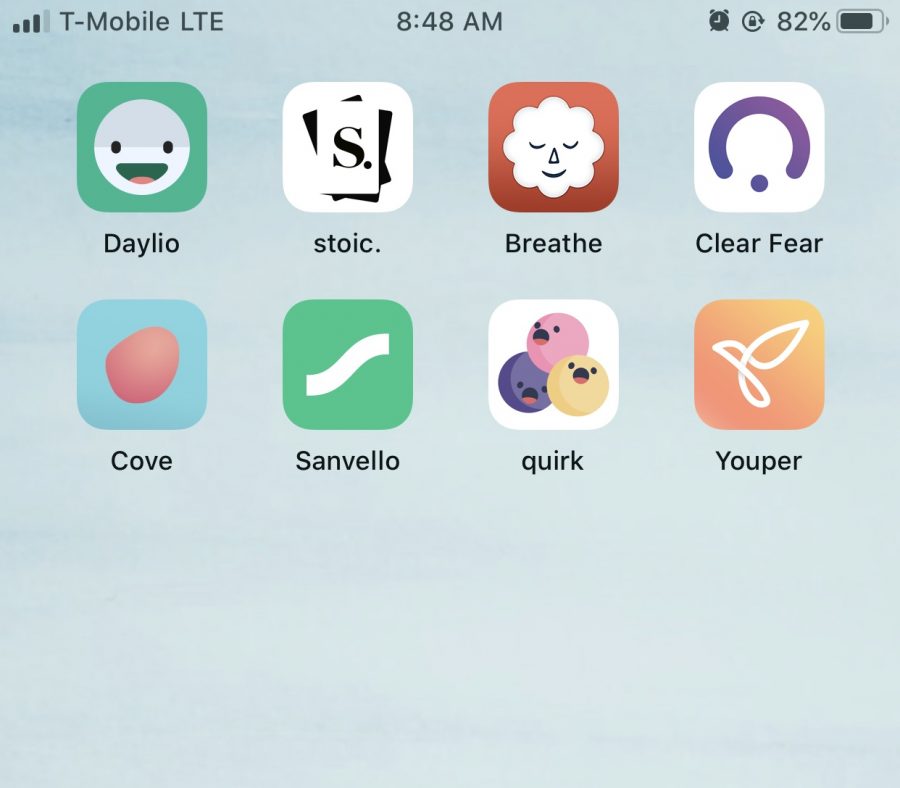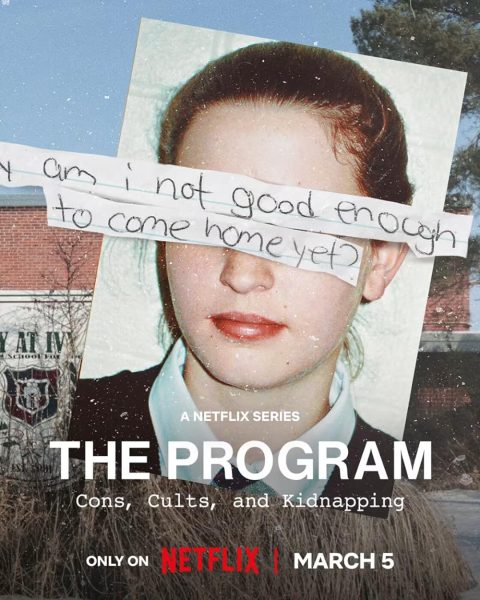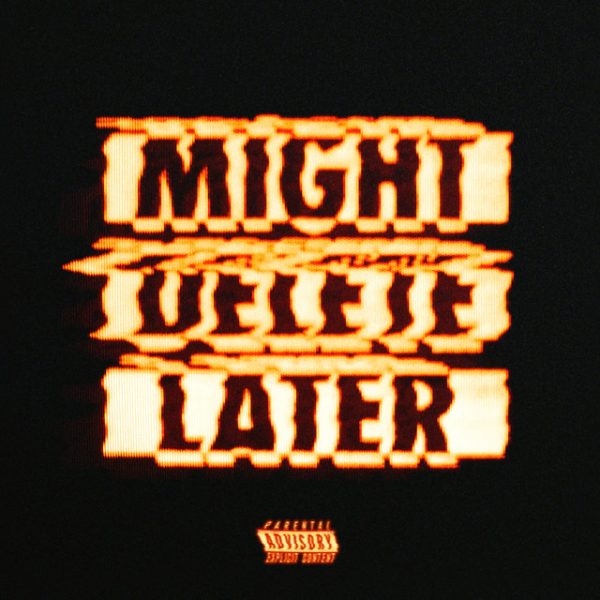The top mental health apps of 2019
Phones provide a new way for teens to deal with stress, anxiety and depression
Daylio, Stoic, Stop, Breathe, and Think, Clear Fear, Cove, Sanvello, Quirk and Youper were among the top mental health apps of 2019. They range from journaling, mood tracking, AI chatbots and more.
November 26, 2019
High schoolers are facing exceedingly high levels of stress, anxiety, depression and other mental health issues. Teens today have higher levels of stress than adults do. The US Health and Human Services Department reported that 31% of adolescents in 2017 dealt with depressive symptoms and 32% dealt with anxiety. While there is no substitute for professional treatment, using mental health apps can be a practical and accessible way for high schoolers to cope with their daily struggles.
Mental health apps currently available range from journaling apps, Cognitive Behavioral Therapy-based apps, mindfulness apps, mood trackers and more. Here are some of the most popular mental health apps and whether they are actually worth downloading.
Daylio
Free, premium option ($7.99)
For those looking for a simple mood tracker app, Daylio is perfect, particularly for busy high schoolers who don’t have the time or energy to spend filling out long journal entries or doing stress relief activities. In the app, users record how they felt during the day along with any activities they did. Over time, they can see the correlation between certain activities, like school or watching TV, and how their day went. Individuals can customize the app and add activities that they do often or moods to describe their day. It doesn’t offer much beyond that, so people searching for an app that will help them cope with daily stress, anxiety or mental health should keep looking. It’s a simple concept that the uncomplicated interface melds well with.
Stoic
Free, premium option ($29.99 per year)
Unlike many other mental health apps, Stoic is based on ancient stoic philosophy rather than on traditional psychological theories. Stoicism is essentially the idea that suffering and difficulties should not be feared, but accepted without complaint. The app manages to capture these principles well while still being accessible to people who don’t follow or know much about stoicism. This is aided by the simple black and white interface. The app includes a variety of unique features that go more in depth, so those who are looking for an alternative to the more simple and straightforward mood trackers will enjoy this. There are journaling activities which ask questions beyond the standard “how was your day” along with morning and evening routines which are catered to the individual user. High schoolers may appreciate the more out of the box approach which allows users to do things like fear setting (an alternative to goal setting). Stoic is geared towards those looking to get more in touch with their emotions and shift their mindset rather than dealing strictly with anxiety or other issues.
Youper
Free, premium option ($3.75 per month or $44.99 per year)
Youper is an AI chatbot app which aims to improve emotional well-being. The computer program guides users with questions about things that are stressing them, how their week has been going and more. The creative design of the app is made to look similar to texting apps, so teens may feel more comfortable sharing their emotions. Because most teens are more familiar with digital communication, this app offers them the chance to verbalize difficult feelings without having to speak face-to-face. Even though it utilizes AI rather than a real person, Youper still manages to facilitate genuine reflection while giving users control over the conversation. It mixes the modern technology that most high schoolers are used to with evidence-based therapy methods. Given that the app uses a chatbot, the conversations are not very personal, but they do incorporate a surprising amount of content about thought patterns and psychology rather than simply being a space for people to label their emotions like a mood tracker. There are also a number of other features including a personality test, mood insights, symptom monitoring and more. It’s clear that a lot of time and expert knowledge was invested into Youper.
Sanvello
Free, premium option ($8.99 per month or $53.99 per year)
This app is geared more towards people with anxiety or depressive symptoms. One unique feature of Sanvello is that it offers a space for users to interact with people who are dealing with similar issues, including a place specifically for teens in high school to vent or talk about their problems. Even with a large variety of features, the app is easy to navigate and the interface is both clean and engaging. The app is essentially a toolkit with different coping mechanisms and activities for whatever the user’s goals are, such as building confidence or mindfulness. There are motivational videos, articles, journaling guides, meditation and many more things to choose from. It is convenient because users can choose which activities to do based on what they are feeling in the moment. The premium option is on the more expensive side, but there are plenty of activities offered within the free version.
Stop, Breathe, and Think
Free, premium options ($9.99 per month or $58.99 per year)
Stop, Breathe, and Think is a guided meditation app that tracks the user’s emotions to personalize their recommendations. Among the recent wave of mindfulness apps, it doesn’t manage to set itself apart too much. It offers generic features like monthly overviews for mood tracker and a breathing timer but nothing groundbreaking or unique. It includes activities for children and college students though there is not any specifically for teens. The guided meditations themselves are not really exceptional in comparison to other apps, unless you enjoy meditations that are based on reflection and thinking rather than mindfulness. It doesn’t offer many sessions or features without a premium subscription, and it’s not worth the investment.
Clear Fear
Free
Clear Fear is an app for young people dealing with anxiety. It was designed for those with anxiety disorders, but its features would prove useful to any teenager dealing with the stress of high school. It’s one of the few apps made specifically for kids and teens. While some parts of the app seem like they’re made more for children, the app’s anxiety tracker, journaling, goal setting and other activities can be useful for all ages. One of the standout features is a personal safety net where users can include emergency contacts, support networks and coping methods. It’s top-notch interface with appealing illustrations and bright colors is perfect for younger people and easy to navigate. The overall idea of the app is simple and based on Cognitive Behavioral Therapy (CBT) techniques for coping with anxiety.
Cove
Free
While Cove’s concept of a daily journaling app is not new, the creative execution is unlike any other. It includes standard features like mood tracking and journaling, but it also lets users capture their emotions by creating a song. Users scroll across a music board to find the tone that best suits their mood and from there they can adjust the bass, percussion and melody to fit their emotions more precisely. It forces users to process their emotions and really dig in to how they are feeling in a completely captivating way. The app is especially useful for high schoolers who prefer to express themselves through musical or creative mediums rather than by journaling with words. At no cost to download or use, Cove is certainly worth trying out.
Quirk
Subscription-based ($5.99 per month)
Quirk’s well-designed interface and adorable illustrations allow this app to hold its own against other mental health apps, but its approach to CBT based methods really sets it apart. Instead of offering the typical mood tracking and journaling features, Quirk asks users to challenge their negative thoughts rather than just record them. It teaches users in simple terms about cognitive distortions, so even those without a lot of experience with CBT can connect with the concepts. For teens with low self esteem, relationship issues or other problems, this app allows them to change their thinking patterns early in life. The app’s convenience lies in the user’s ability to use it immediately when they catch themselves in negative thought processes. The app is both visually appealing and effective as it not only introduces people to healthier ways of thinking, but it offers the tools to implement them.
Mental health apps can offer a wide variety of coping mechanisms and features. Apps like Cove, Stoic, Youper and Quirk take more unique approaches and others like Sanvello and Clear Fear stick with proven methods. Sanvello offers a lot of features in one place while Daylio is more simple. Some, like Stop, Breathe, and Think, don’t provide many original features at all. Whether these apps are worth downloading depends completely on the user, their mental health and what they are looking for.
















